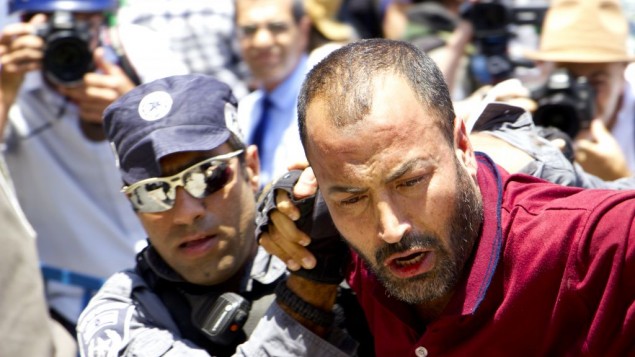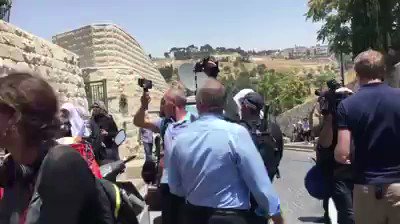Police arrest a demonstrator during scuffles at Lions Gate; holy site reopened to non-Muslims after closure over Jewish prayer
BY DOV LIEBER AND ALEXANDER FULBRIGHT, TOI

Clashes between Muslim protesters and Israeli police erupted Wednesday at one of the entrances to Jerusalem’s Old City for the fourth day in a row over new security measures at the Temple Mount following a recent terror attack.
Around 150-200 worshipers had gathered neared the Lions Gate and performed the afternoon prayer, as part of their protest against the placement of metal detectors at the Temple Mount’s gates.
Following the prayers, a few men remained and shouted chants about the Al-Aqsa Mosque whereupon the police asked them to move. When one man refused, police started to arrest him, and worshipers nearby began to throw water bottles at the officers. Police threw stun grenades, and the crowd dispersed in under a minute.
Police said that the man was detained for “disturbing the peace.”
A video clip circulating on social media appeared to show officers beating one protester in the face, a day after officers were filmed beating an Israeli Arab reporter for the Hebrew-language Ynet news site.
The clashes came as Jerusalem police chief Yoram Halevi instructed officers to reopen the Temple Mount to non-Muslims, hours after he ordered the site closed following a violation of the holy site’s rules by Jewish visitors.
A police spokeswoman said the closure was ordered after a group of Jewish visitors who attempted to pray on the Temple Mount was removed from the site. According to the Haaretz daily, the Jewish visitors entered the Temple Mount with prayer books and attempted to pray, despite rules at the site forbidding prayer by non-Muslims.
The site has reemerged as a flashpoint in recent days, with Muslim protesters holding at-times violent demonstrations outside of the Old City in protest of Israel’s placement of metal detectors at the gates to the Temple Mount, following the terror attack last week in which a trio of Arab Israelis shot dead two police officers guarding one of the entrances to the site.
The metal detectors were part of increased security measures after police said the attackers had stashed their weapons on the Temple Mount.
Following the terror attack, in which the gunmen killed two Israeli Druze police officers, Israel made the rare move of closing the compound while it searched for more weaponry there, reopening it to Muslims on Sunday and to non-Muslims on Monday.
Since it was reopened to non-Muslims, a number of incidents have been recorded of Jews praying at the site, including on Tuesday when police said they removed and later detained two visitors to the Mount.
In light of the ongoing tensions, Prime Minister Benjamin Netanyahu, who is on a state visit to Hungary, on Wednesday morning discussed the volatile situation on the Temple Mount in a telephone briefing with his security chiefs, but no operative decisions were taken.
Another security consultation was planned for the later in the day..
Defense Minister Avigdor Liberman, Public Security Minister Gilad Erdan, IDF Chief of Staff Gadi Eisenkot, Police Chief Roni Alsheich, Shin Bet head Nadav Argaman and other senior official participated in Wednesday morning’s phone conference.
To protest the new security measures, officials from the Muslim Waqf, which administers the site, have staged protests in the Old City, gathering large groups of men to pray just outside the Temple Mount and encouraging others to avoid entering the compound.
Those protests devolved into clashes between worshipers and police for three evenings in a row, including on Tuesday night, when according to police, a group of Muslim worshipers “started throwing rocks and bottles at the officers” who were stationed in the Old City.
In response, the officers used riot dispersal equipment — notably rubber bullets and stun grenades — to break up the riot, police said.

Israeli security forces clash with Palestinian demonstrators outside the Lion’s Gate in Jerusalem’s Old City on July 18, 2017. (AFP/Ahmad Gharabli)
The Palestinian Red Crescent said 34 people were injured, including 14 people needing hospitalization. One person had a serious chest injury, a spokesperson said.
Police said two officers were lightly injured in the fighting and calm was restored to the area after the clashes.
Earlier on Tuesday evening, police had said that while many Muslim worshipers had decided to protest the metal detectors, others had accepted them and visited the Temple Mount. The assertion came as members of the Waqf persisted in their calls for Muslims not to enter through the metal detectors, which were installed Sunday.
The Palestinian Fatah movement called for a “Day of Rage” on Wednesday to protest the new security measures.
The organization, headed by Palestinian Authority President Mahmoud Abbas, called for marches in the West Bank toward Israeli checkpoints in protest of the new measures and announced that Friday prayers, when many worshipers go to the Temple Mount, would be conducted in public squares instead.

Waqf officials lead Muslim prayers outside the Temple Mount in Jerusalem’s Old City on July 16. (Yonatan Sindel/Flash90)
Palestinian officials denounced a “fierce and organized attack” by Israel against East Jerusalemites. They called for maintaining the delicate status quo at the Temple Mount, according to which the Waqf manages the site while Israel controls access. Muslims accuse Israel of breaking the status quo by installing the metal detectors.
Misinformation regarding Israeli plans to make changes to the status quo surfaces frequently, roiling the Palestinian street and angering the Arab world.
Israel has said repeatedly it has no plans to change the status quo at the Mount. It has always been responsible for security there, and Friday’s attack necessitated upgraded security, officials said. All visitors to the Western Wall plaza, below the Mount, have long had to pass through metal detectors, as have non-Muslim visitors to the Mount, who gain access via the Mughrabi Gate.
Raphael Ahren and Judah Ari Gross contributed to this report.




Leave a Reply
You must be logged in to post a comment.